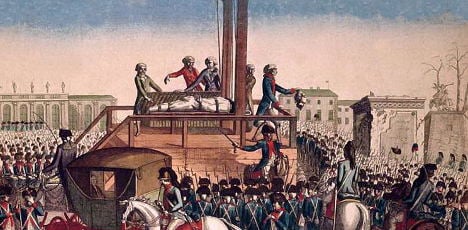The cloth, measuring 9 cm by 13 cm (3.5 by 4.7 inches), comes in a miniature coffin.
It is accompanied by a handwritten piece of paper that says: "The precious blood of Louis XVI, 21 January 1793" – the day he was guillotined in the heart of Paris.
The sale will take place on April 3 at Hotel Drouot, said Coutau Begarie, another auction house which is putting a range of historic items under the hammer.
Parisians had jostled to take souvenirs after the execution including snippets of the monarch's hair. They also dipped their garments or cloth in the pool of blood left near the guillotine.
But expert Cyrille Boulay told AFP that only a DNA test on the sample up for sale could prove if the cloth really contained Louis XVI's blood.
Another item up on sale is a silver buckle from the king's shoe, Coutau Begarie said.



 Please whitelist us to continue reading.
Please whitelist us to continue reading.
Member comments